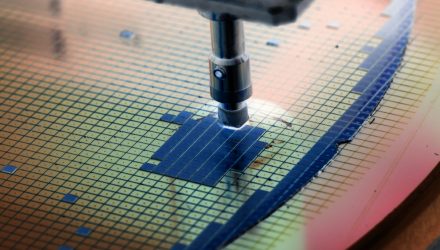Recently, some clarity emerged on Nvidia (NASDAQ: NVDA) and Taiwan Semiconductor (NYSE: TSM) — two of the most important names in the semiconductor industry.
That could prove to be good news for the related exchange traded funds, including the VanEck Semiconductor ETF (SMH). The $9.7 billion SMH is highly pertinent in this conversation because Nvidia and Taiwan Semiconductor are the ETF’s two largest holdings. They combine for just over 31% of its roster.
Last week, Nvidia slipped 7.66% amid some social media speculation regarding one of its customers. Making a long story short, unfounded rumors surfaced that CoreWeave –a company in which Nvidia is invested — is no more than shell company. However, analysts, including Bernstein’s Stacy Rasgon, defended Nvidia while debunking the conspiracy theories surrounding CoreWeave.
CoreWeave started out as a cryptocurrency company. It is now transitioning to cloud computing. That might be fueling wild thoughts, be they unfounded, among some market participants.
“Beyond somewhat hilariously confusing ‘Blackstone’ with ‘Blackrock’ during the process, this is also nonsense. Nvidia did not need help from CoreWeave (or anyone) to juice the quarter (their products are all on allocation), and the [CoreWeave] debt facility was announced August 3 (after the quarter was completed) with the release suggesting deployment has likely not happened yet,” wrote Ragson.
Looking Into Taiwan Semiconductor
While Nvidia tumbled last week, Ragson bringing clarity to the situation is relevant. It could provide support for a rebound by SMH’s largest component.
There’s important, but less juicy news pertaining to Taiwan Semiconductor, which is SMH’s second-largest holding. In a recent note to clients, Wedbush analyst Matt Bryson observed that data indicate the company realized July and August sales equivalent to 69% of analysts’ estimates for the third quarter. Typically, the chip foundry operator generates two-thirds of its third-quarter top-line in those two months.
It might be wise not to read too much into that observation. Still, it can be seen as good news, particularly after Taiwan Semiconductor pared its 2023 revenue forecast in July. Should demand outside of the artificial intelligence market pick up, the stock stands to benefit. Also, it could potentially propel SMH along the way.
Wedbush’s Bryson has a “positive” rating on the SMH component with a price target that implies upside of 20% from current levels. Taiwan Semiconductor controls an estimated 60% of the global third-party chip production market. This is nearly triple the amount held by its next closest rival.
For more news, information, and analysis, visit the Beyond Basic Beta Channel.







